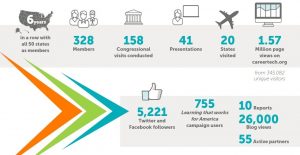Last week was certainly a big one for apprenticeships! In the midst of White House announcement, U.S. Department of Labor memo and the introduction of legislation in the Senate was the release of a new report form Advance CTE – Opportunities for Connecting Secondary Career and Technical Education Students and Apprenticeship Programs.
This new report was commissioned by the U.S. Department of Education and prepared by Advance CTE with support from Jobs for the Future, Vivayic and RTI International to help state and local leaders begin to understand the ways in which they could expand access to apprenticeships for high school students, and bring the CTE and apprenticeship systems into better alignment.
At the center of this paper are eight case studies of aligned CTE-apprenticeship programs, which Advance CTE and its partners visited last year to see how they were providing opportunities for high school students to engage directly in pre-apprenticeships, youth apprenticeships and/or registered apprenticeships.

While the eight sites differ in structure, intensity and the state policy environment, there are common lessons learned that apply to any state and local leader looking to build such programs in their own communities.
For example, when it comes to program design, we found there is no inherently “right” or “wrong” approach to connecting CTE students to apprenticeship programs. The sites’ geographic, socioeconomic, and resource characteristics, and differing administrative or legislative policies, all impacted program structure. That being said, when considering program design, a few takeaways emerged:
- Programs must align with workforce demand, at the state, regional, and local levels – an lead to real employment options for students.
- Effective programs require meaningful collaboration and buy-in from all partners. Teachers, employers, parents, and students must see the value of their participation if the program is going to succeed
- At most sites, the drive for the program came from employers and/or labor associations seeking to bolster their pipeline of workers – and this was key to their launch and success.
- There is no minimum or maximum number of students who should participate in a program. Program size simply has to be a function of regional demand and available placements with apprenticeship sponsors- and so some program just need to stay small
Advance CTE & Apprenticeships
From Advance CTE’s perspective, aligning CTE and apprenticeship programs, policies and systems is simply common sense. It comes down to providing more pathways to college and career success for more students and for strengthening our overall talent pipeline in key industries like advanced manufacturing, IT and construction, which leveraging existing structures. But, we still see too many missed opportunities due to largely disconnected systems.
This is why, even as this project winds down, we will continue to support efforts to strengthen apprenticeships, and their connections to CTE at the secondary and postsecondary levels, through partnerships like Apprenticeship Forward and ongoing discussions with OCTAE and the U.S. Department of Education Office of Apprenticeship.
Related Resources
In addition to the report, OCTAE also commissioned supportive resources to help state and local leaders turn this research into action, including two recently-released videos on Expanding Opportunities: Aligning CTE and Apprenticeship and Elements of CTE and Apprenticeship Alignment. Later this summer, OCTAE will be releasing a planning guide, templates and mini-guides to bring all the key partners to the table.
Kate Kreamer, Deputy Executive Director



 As the first month of the New Year comes to a close, we’re excited to share a new resource and new supporter of
As the first month of the New Year comes to a close, we’re excited to share a new resource and new supporter of 
